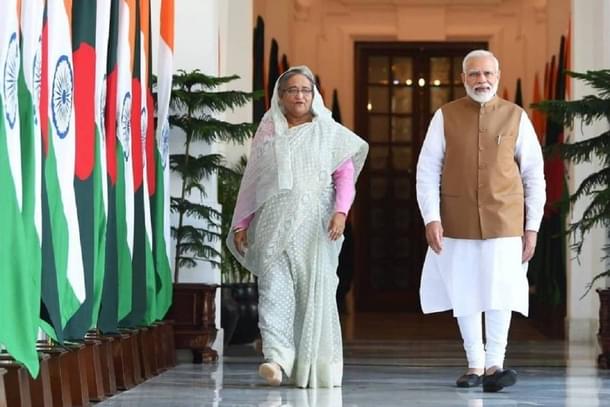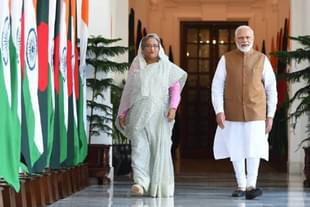World
India's Support Helped Sheikh Hasina Defy US Pressure In Elections — Now, It's Time To Call In A Favour
Jaideep Mazumdar
Jan 08, 2024, 01:29 PM | Updated 01:29 PM IST
Save & read from anywhere!
Bookmark stories for easy access on any device or the Swarajya app.


Sheikh Hasina’s triumphant return to power in Bangladesh on Sunday (7 January) was entirely expected. There was never any doubt about her becoming the Prime Minister of the country for the fourth straight term.
That said, Hasina owes a lot to New Delhi for helping her withstand the pressure from the West ahead of the elections.
Till even two months ago, the US and other Western powers were breathing down her neck and trying to compel her to accede to the demands of the Bangladesh Nationalist Party (BNP) that she steps down in favour of a neutral caretaker government.
The BNP had held that only a neutral caretaker government would be able to ensure free and fair elections. It declared that it will boycott the elections if the Awami League (AL) government does not step down.
Keen on imposing their own version of ‘democracy’ and ensuring ‘participatory’ elections, the US, European Union and some other nations started leaning heavily on Hasina to accommodate the BNP’s demand.
Envoys of the US and Western nations started interfering blatantly in the election process by intervening directly with the Bangladesh Election Commission and asking the latter to defer elections and address the BNP’s concerns.
The US warned that it would deny visas to those it deemed to have subverted democracy in Bangladesh.
Hasina appealed to New Delhi for help to stave off all the pressure. And New Delhi responded positively (read this).
India explained to the US and other friendly Western nations that their actions would push Hasina directly into China’s embrace, thus harming the West’s strategic interests in the region.
New Delhi also explained to the Western nations that playing footsie with the BNP would amount to boosting radical Islamists forces who are closely aligned with that party. The top Indian leadership took up this issue directly with their counterparts in the West.
India, thus, successfully got the US and other Western countries to back off and stand down.
And even though the BNP ultimately boycotted the elections while the AL government jailed the entire top BNP leadership and thousands of BNP functionaries and activists on charges of arson and rioting, the West did not interfere.
The just-concluded elections in Bangladesh were not really free and fair, and can attract a fair amount of censure.
The AL government went overboard in detaining Opposition leaders on trumped-up charges. Many anomalies came to light and there have also been credible reports of AL cadres rigging the polls. The turnout was a mere 40 per cent, the lowest in the past three decades.
But all that has not triggered any criticism from Western capitals as one would have expected. Such criticism would have made Hasina’s victory a bitter one. And she has only India to thank for saving her from that embarrassment.
It is now time for India to ask Hasina to return the huge favour that New Delhi did to her. These are a few steps India should insist that the new AL government takes:
1) Cut Off Ties With Islamist Forces
It is common knowledge that the Awami League has been flirting with radical Islamist groups like the Hefazat-e-Islam Bangladesh to counter the BNP-affiliated Bangladesh Jamaat-e-Islami.
Hasina should be asked to cut off ties with all Islamists and also purge her party of radicals who have infiltrated its ranks.
Radical Islamists are becoming stronger in Bangladesh and that poses a grave threat not only to India, but also the rest of the world.
2) Roll-Back Measures To Appease Islamists
In a desperate bid to keep radical Islamists on its side, Hasina initiated a number of measures to appease them.
For instance, she granted recognition to ‘degrees’ handed out by Islamic seminaries and accorded them the same status as general degrees. As a result, Islamist mullahs started getting government jobs and have infiltrated the country’s administrative apparatus.
Hasina also provided a huge amount of funds to construct masjids and madrassas.
Such appeasement, New Delhi should tell Hasina, must be rolled back.
3) Make Bangladesh A Truly Secular Republic
Bangladesh was founded as a secular republic in 1971, but military dictator Ziaur Rahman (slain husband of current BNP chairperson Khaleda Zia) removed secularism by a martial law decree from the country’s constitution in 1977. Another military dictator, H M Ershad (founder of the Jatiya Party) made Islam the state religion in 1988.
Though the Supreme Court of Bangladesh struck down Ziaur Rahman’s decree (replacing secularism in the Constitution) as illegal in 2010, Islam continues to be the state religion of Bangladesh and the attitude of all parties (including the Awami League) towards secularism continues to be ambivalent.
New Delhi must push Hasina to restore the 1971 status of the Constitution and jettison Islam as the state religion.
4) Protection Of Religious Minorities
Bangladesh has a shameful track record of persecution of religious minorities. Hindus, Buddhists and Christians in the country have been subjected to persecution by Islamists in the AL, the BNP and also the country’s administrative machinery.
New Delhi should make it very clear to Dhaka that such persecution needs to stop immediately.
One major reason why this persecution continues is because of the immunity enjoyed by radical Islamists. Bangladesh has failed to prosecute those who have attacked or killed religious minorities, taken over properties of minorities or subjected them to torture, forcible conversion to Islam and other indignities.
Dhaka should be told firmly that inaction against those who persecute minorities will be unacceptable.
5) Containing China
Egged on by Islamists in her party, Hasina has been over-indulging the Chinese and granting them too many projects and favours in her country.
As a result, China’s influence has grown exponentially in Bangladesh over the last one decade.
Hasina has been reiterating openly that India is now dependent on her favours and she has granted more concessions to India than India has granted to Bangladesh.
While that may or may not be true, what is now required is for India to move quickly to secure its interests in Bangladesh. India has to lean heavily on Dhaka to effect a course correction by navigating away from Beijing and steering itself westwards towards New Delhi.
6) Reinforce Democracy
Hasina has shown totalitarian tendencies. She has throttled Opposition and that has, unfortunately but expectedly, given a chance to Islamist forces to occupy the void created by the withdrawal of mainstream Opposition forces from the political space.
She must be pushed now to allow Opposition parties enough legroom for political activities. India cannot be seen to be backing an increasingly dictatorial Hasina. That will trigger a blowback against India ultimately.
7) Forge Links With Opposition Parties
Right now, New Delhi has no influence over the BNP or other opposition parties. Admittedly, the BNP has been anti-Indian and had worked against India’s interests when it was in power.
But shunning the BNP completely is an unwise course of action. It will be advisable for New Delhi to engage with the BNP, as it does with opposition parties in other countries, and prop up a strong pro-India lobby within that party’s leadership.
The AL is not going to remain in power in Bangladesh forever. The BNP will also rule someday in future, and India should have enough friends in the BNP’s top echelon to ensure continuity of its interests in Bangladesh then.
India should work closely with the Western nations to push Hasina to cut off ties with Islamists and also crack down on radical Islam which is growing in her country.
Bangladesh is critically dependent on Western countries for exports, especially the readymade garments it exports to the West. Last year, Bangladesh earned $47.39 billion by exporting readymade garments to the West. The export earnings of the readymade garments sector accounts for around 18 per cent of the country’s gross domestic product.
Bangladesh is also dependent on Western nations for a lot of its imports and for critical technology and equipment. It exports manpower to many Western countries and the remittances from them account for a substantial portion of its economy.
As such, Bangladesh is dependent on the West for a number of things. The West, thus, has considerable leverage over Bangladesh.
India must work with these Western nations — the USA, UK, France, Germany and some other friendly countries with which India shares very good ties — to apply pressure on Bangladesh to root out Islamist radicals from the country and also steer gradually away from China.
Hasina owes a huge favour to New Delhi. The latter must not be diffident in calling in that favour.
Also read:
-Why India needs to tell the US to lay off the upcoming parliamentary elections in Bangladesh
-Why outcome of a ‘free and fair’ election in Bangladesh could spell danger for the world





